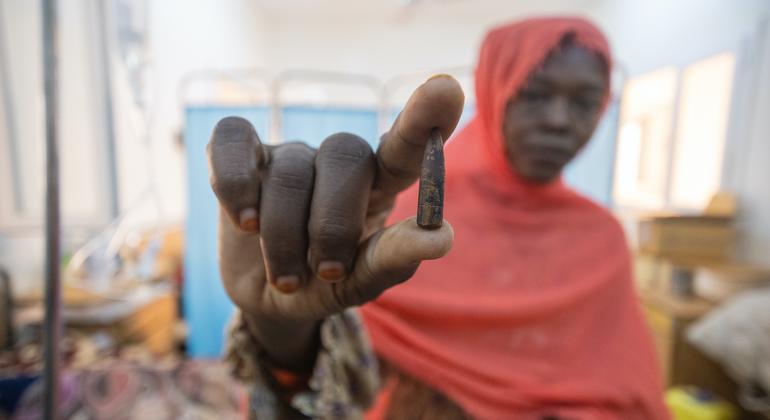Mohamed Refaat, IOM Chief of Mission in Sudan, was speaking to reporters after returning from previously inaccessible Khartoum state, which is now back under the control of the Sudanese Armed Forces (SAF).
War erupted between the SAF and former ally the Rapid Support Forces (RSF) in April 2023, and civilians continue to bear the brunt of the violence.
Recent weeks have seen intense fighting around the capital city, Khartoum, which had mostly been under RSF control.
‘Unimaginable’ destruction
Mr. Refaat said that even he was shocked by the level of destruction in the city.
“Electricity stations have been looted; the water pipes have been destroyed. And I’m not talking about some areas. I’m talking about everywhere I went,” he said.
The veteran aid worker has served in other conflict situations, including Libya and Yemen, “and the level of destruction I have seen in Bahri, Khartoum, is unimaginable,” he remarked.
“There has been targeting of not only people’s houses, but administrative areas, not military areas, but all the basic infrastructure that can maintain lives for people.”
Massive re-investment is needed to help all those returning to the Sudanese capital after nearly two years of war, he said.
Horrors all around
Mr. Refaat described meeting Sarah, an elderly maths teacher, unable to flee the violence. Her days had been “filled with horror”, witnessing the loss of loved ones, seeing homes destroyed and being surrounded by the permanent threat of violence and sexual abuse.
“Sarah’s decision to stay was driven by necessity,” he explained. “As an elderly woman, it would be dangerous and challenging to go by foot, and she has no transportation.”
In the absence of funding, many non-government organizations (NGOs) have stopped working or reduced operations. Mr. Refaat insisted that there are many more people like Sarah who have received no assistance.
Funding crisis widespread
“Funding has dried (up) but not only from Member States, but also from diaspora and charity organizations,” he said.
He stressed that more humanitarian funding is urgently needed for medicine, shelter, drinking water, education, and healthcare.
IOM is seeking $250 million to assist some 1.7 million people in Sudan this year but less than 10 per cent of funding has been received.
Families on the run
The UN is gravely concerned by reports that civilians are fleeing Khartoum city due to violence and fears of extrajudicial killings after Government forces regained control of the capital, UN Spokesperson Stéphane Dujarric said on Friday in New York.
Over the past week, some 5,000 displaced people, mostly from Khartoum, arrived in Jabrat El Sheikh in North Kordofan state, according to UN aid coordination office OCHA.
Partners on the ground said families urgently need food, clean water, proper shelter and healthcare
“Reports also indicate that others have fled Khartoum and other areas towards Um Dukhun, which is located in Central Darfur,” said Mr. Dujarric. The UN and humanitarian partners are working to verify the reports.
A wider trend
The latest movements are part of a broader trend of conflict-driven displacement impacting multiple regions in Sudan, including the Blue Nile and South Kordofan.
The overall situation across the country “remains complex and challenging,” he said, with civilians fleeing for their safety in some locations and trying to return home in other locations where basic services often have been decimated.
OCHA is working to reach people in the South Kordofan capital Kadugli by facilitating the dispatch of a humanitarian convoy carrying nutrition, health and water purification supplies.
However, the convoy remains stalled in Al Obeid, the capital of North Kordofan, due to insecurity and bureaucratic impediments.
Not a target
On Thursday, UN humanitarian affairs chief Tom Fletcher expressed outrage over reports of escalating attacks against community kitchens and safe spaces run by volunteers.
In a social media post, he stressed that the work of these frontline volunteers is vital to people’s survival after almost two years of war, underscoring that humanitarians must be protected and supported, not targeted.
Mr. Dujarric reiterated his message.
“At the risk of sounding like a broken record, we remind all parties that under international humanitarian law, they have a legal obligation to allow and facilitate rapid, unimpeded and impartial humanitarian relief for civilians in need, regardless of the location or the affiliation of these civilians,” he said.



